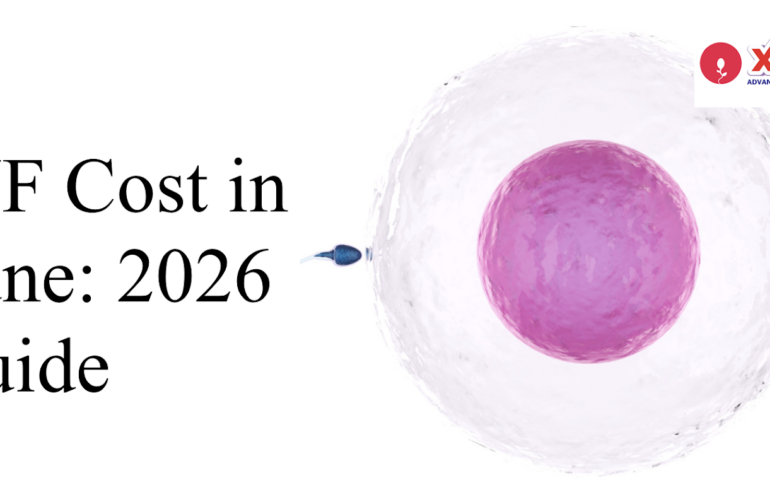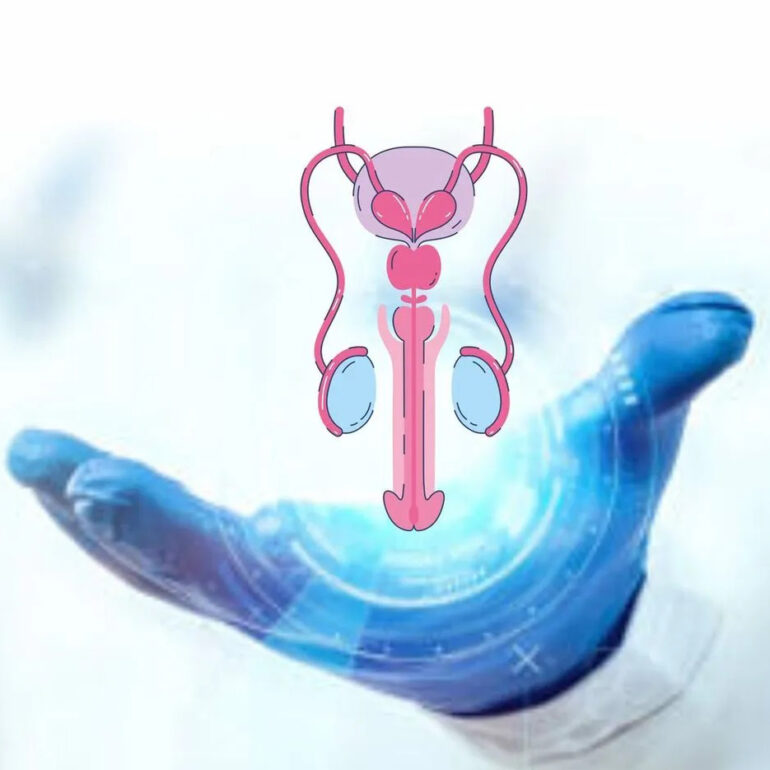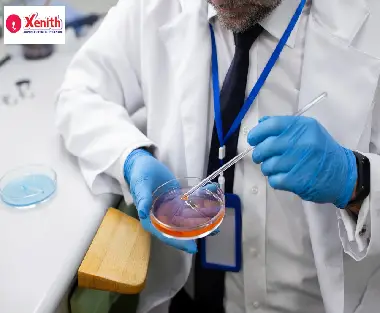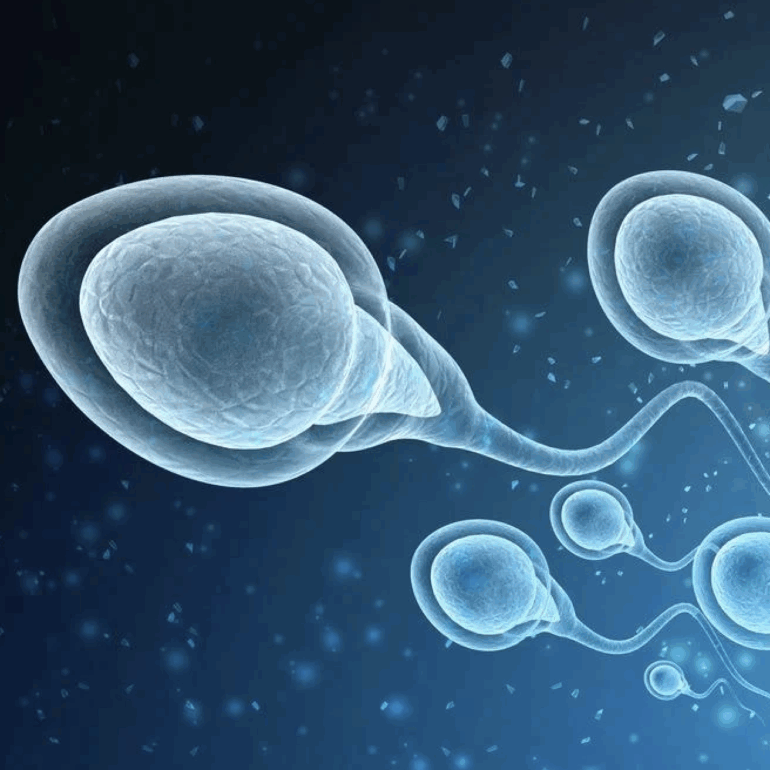Introduction to Egg Freezing Treatment
Egg freezing, also known as oocyte freezing by vitrification, is an advanced fertility preservation technique that allows women to store their eggs for future pregnancy. This process is particularly beneficial for women who wish to delay childbirth due to career, personal, or medical reasons. With advancements in vitrification technology, eggs can be frozen and stored for extended periods without compromising their quality, offering a reliable solution for long-term fertility preservation.
Fertility declines with age, and egg freezing provides women with the flexibility to conceive later in life using their younger, healthier eggs. Unlike traditional slow-freezing methods, vitrification rapidly freezes the eggs, preventing ice crystal formation and enhancing the survival rate of eggs after thawing. This egg freezing procedure is widely recognized for its high success rates.

Free Thursday Consultation
Book Your AppointmentXenith Hope Circle
Join our new WhatsApp community
Egg freezing is a suitable option for various groups of women, including:
- Women delaying pregnancy for career growth, education, or personal reasons. By preserving their eggs at a younger age, they increase their chances of a successful pregnancy later.
- Patients undergoing chemotherapy or medical treatments that may affect ovarian function. Egg freezing before treatment ensures they have the option to conceive after recovery.
- Women with a family history of early menopause who want to secure their fertility before ovarian reserve declines.
- Those considering IVF in the future but wish to preserve their eggs while they are still of high quality.
- Who should freeze their eggs? Women in their late 20s to early 30s who want to proactively preserve their fertility.
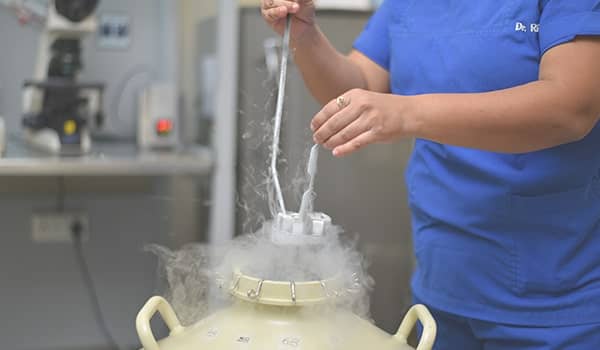
The cost of egg freezing varies depending on several factors, including clinic location, the number of cycles needed, and additional storage fees. How much does egg freezing treatment cost? A breakdown of treatment costs typically includes:
- Consultation & Initial Fertility Tests – Blood tests (AMH, FSH) and ultrasound to assess ovarian reserve.
- Ovarian Stimulation & Medication – Hormonal injections to stimulate egg production.
- Egg Retrieval Procedure – A minimally invasive process performed under sedation.
- Freezing & Storage – Eggs are frozen using vitrification and stored in liquid nitrogen.
- Annual Storage Fees – Ongoing costs for maintaining eggs in cryopreservation.
- Multiple cycles may be needed to collect a good number of eggs, especially in women over 35.
Many clinics offer financing options & payment plans to make egg freezing more affordable for women looking to invest in their reproductive future.
Step 1: Fertility Assessment & Consultation
- Blood tests such as Anti-Müllerian Hormone (AMH) and Follicle-Stimulating Hormone (FSH) to evaluate ovarian reserve.
- Ultrasound imaging to assess antral follicle count.
- A personalized fertility plan is developed based on the patient’s age and reproductive health.
Step 2: Ovarian Stimulation & Monitoring
- Hormonal injections stimulate the ovaries to produce multiple eggs.
- Regular ultrasound monitoring tracks follicle growth and ensures the correct response to medications.
- Hormonal injections are given for about 8–12 days and are self-administered or taken at the clinic.
- The entire process from stimulation to retrieval usually takes 10–14 days.
Step 3: Egg Retrieval
- A minimally invasive procedure performed under sedation.
- Eggs are collected through ultrasound-guided aspiration, typically taking 10-15 minutes.
Step 4: Freezing & Storage
- Retrieved eggs are rapidly frozen using vitrification technology.
- The eggs are stored in liquid nitrogen, ensuring long-term viability without degradation.
- Oocyte freezing and storage duration – Eggs can be stored for many years, with studies showing successful pregnancies even after a decade.
Step 5: Thawing & IVF
- When the woman is ready to conceive, the frozen eggs are thawed and fertilized using IVF (In Vitro Fertilization).
- Not all frozen eggs may survive thawing or fertilize, which is why a higher number of eggs is generally recommended for better chances.
- How effective is oocyte freezing for IVF? Studies show high pregnancy rates when using frozen eggs, making this an effective option for future pregnancies.
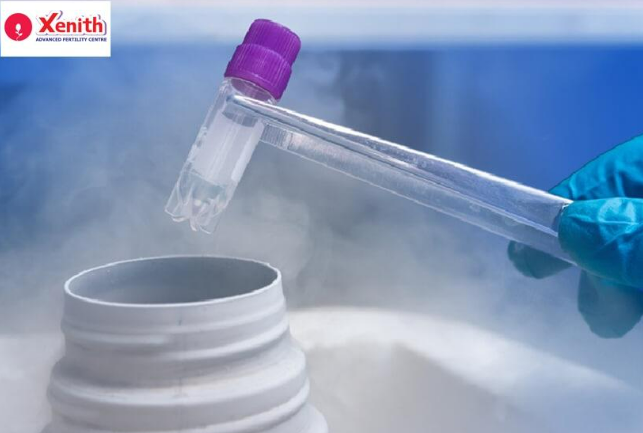
Success rates for egg freezing depend on various factors, including the woman’s age at the time of freezing and the number of eggs stored.
- Egg freezing treatment success rate by age – Women under 35 tend to have better-quality eggs, leading to higher success rates.
- Egg survival rates after thawing – Vitrification ensures an egg survival rate of over 90% after thawing.
- Pregnancy chances using frozen eggs – The success of IVF with frozen eggs depends on the number of eggs available, embryo quality, and overall reproductive health.
- Success rate of egg freezing – Clinical data shows that younger women who freeze 10-20 eggs have significantly higher live birth rates.
EXCELLENTTrustindex verifies that the original source of the review is Google. We highly recommend this clinic. Dr Mamta Mam Dr Poonam Mam Dr Pooja Mam are extremely humble and experienced doctors. Their overall staff was very kind ,polite and supportive. We are extremely happy with the treatment and positive report. Thank you so much Xenith IVF to make our dream come true.Posted onTrustindex verifies that the original source of the review is Google. We had a very positive experience at Xenith IVF & Fertility. From the first consultation itself, the doctors and staff made me feel heard, supported, and reassured during what can otherwise be an emotionally overwhelming journey. The doctors are extremely patient, knowledgeable, and take time to explain every step clearly without rushing. I really appreciated the transparency in treatment options and the calm way all doubts were addressed. It helped reduce a lot of anxiety. The nursing staff and coordinators are caring, approachable, and well-organised. Appointments were managed smoothly, and follow-ups were timely. The clinic is clean, hygienic, and well maintained, which added to the overall confidence and comfort. Most importantly, I felt treated not just as a case, but as a person. The empathy and emotional support made a huge difference. I would definitely recommend Xenith IVF & Fertility to anyone looking for professional, ethical, and compassionate fertility care.Posted onTrustindex verifies that the original source of the review is Google. Xenith IVF helped make our dream come true through IVF. I am most thankful to Dr. Mamta Dighe, along with Dr. Pooja, Dr. Reshma for their precise diagnosis, exceptional care and support throughout this process. The sisters Mayuri and Pallavi were kind and attentive. Reception team Kalyani, Samiksha and Sharayu were polite and welcoming thought I thought that at rush hours they need more helping hands to support them. Most of the time receptionist team is busy in peak hours and unnecessary wait may result in frustration. Rest all is very well organised, clean and neat.Posted onTrustindex verifies that the original source of the review is Google. Excellent ivf center. Highly recommended. Dr. Mamta is expert in her domain and consistently positive towards the treatment. Special thanks to her for personal attention to each and every detail. All the treatment process was managed with sincerity and transparency. The entire hospital staff is professional and polite. The reception and administrative staff efficiently handle all appointments and queries with great professionalism. Special thanks to Dr. Pooja for her regular guidance and timely support during emergency situations and for patiently addressing all concerns. Overall, the clinic is highly recommended and 100% trustworthyPosted onTrustindex verifies that the original source of the review is Google. I had a wonderful experience at Xenith IVF. The team took amazing care of us throughout the journey and made us feel supported at every step. Truly grateful and very happy with the experience.Posted onTrustindex verifies that the original source of the review is Google. Best doctor's ever, good experience, all staff are supporting.Posted onTrustindex verifies that the original source of the review is Google. Efficient and well-organized center. Friendly and understanding receptionists; amazing and phenomenal service of the doctors. It has truly been a wonderful experience. Thank you.Posted onTrustindex verifies that the original source of the review is Google. After a long journey, Xenith IVF helped make my dream come true through IVF. I am most thankful to Dr. Mamta Dighe, along with Dr. Pooja, Dr. Poonam, Dr. Reshma, and Dr. Minal, for their exceptional care and support throughout this process. The sisters Ms. Sonia, Ms. Mayuri, Ms. Pallavi were kind and attentive, and the reception team Ms. Kalyani, Ms. Samiksha, Ms. Sharayu was polite and welcoming. The clinic maintains state-of-the-art lab facilities with advanced technology and strict hygiene standards, which gave me confidence throughout the process. I also appreciate their complete transparency in procedures and clear communication at every step, which made the experience stress-free and trustworthy. The team ensures maximum patient comfort and provides emotional support during every stage, patiently answering questions and offering reassurance when needed. Xenith IVF is known for its high success rates and personalized treatment plans, which truly make a difference for couples struggling to conceive. Thank you, Xenith IVF, for your dedication and compassionate approach. I highly recommend Xenith IVF to anyone looking for expert care and a supportive team.Posted onTrustindex verifies that the original source of the review is Google. We extend our sincere appreciation for the exceptional service provided by Xeinth. The doctors, particularly Dr. Pooja, demonstrated remarkable expertise and knowledge, offering invaluable guidance and care throughout our experience. Her ability to address each query with clarity and compassion was greatly appreciated. The entire staff, including the nurses, exhibited a high level of professionalism and empathy, making our journey a positive one. Thank you team. We highly recommend Xeinth for their outstanding care and service.
Choosing the right fertility clinic is essential for the success of oocyte freezing by vitrification. Our clinic offers:
- Experienced fertility specialists with a proven track record of high success rates in egg freezing and IVF.
- State-of-the-art laboratory technology ensuring optimal conditions for egg preservation.
- Transparent pricing & flexible payment plans, making egg freezing accessible to more women.
- Best clinic for oocyte freezing by vitrification – Our expertise in vitrification technology ensures the highest survival rates for frozen eggs.
- Best clinic for egg freezing – Recognized for outstanding patient care and cutting-edge fertility treatments.
- Is egg freezing safe? Yes, the vitrification method has been extensively researched and is considered a safe and effective fertility preservation method.
- Book egg freezing consultation – Contact us today to discuss your options and begin your fertility journey.
Egg freezing empowers women with reproductive choices and provides a sense of security for their future family-building plans. If you are considering egg freezing, consult with our experts to explore the best options tailored to your fertility goals.
We understand that fertility preservation is a deeply personal choice. Our team ensures each woman feels informed, supported, and empowered.
Egg freezing is a minimally invasive procedure, and most women experience only mild discomfort. The ovarian stimulation phase may cause bloating or mild cramping due to hormone injections. The egg retrieval process itself is performed under sedation, ensuring it is painless. After the procedure, some women may feel slight cramping, but this typically resolves within a day or two.
The best age to freeze eggs is between 25 and 35 years. Younger eggs have higher quality and better survival rates after thawing, leading to increased chances of pregnancy. While women can freeze their eggs at older ages, success rates decline as egg quality diminishes.
The cost of egg freezing varies depending on location, clinic expertise, and individual treatment needs. Typically, the process includes consultation, ovarian stimulation, egg retrieval, vitrification, and storage fees. Additional costs may apply for long-term storage and future IVF procedures.
The egg freezing procedure consists of several steps:
- Fertility assessment to evaluate ovarian reserve.
- Ovarian stimulation using hormone injections to encourage multiple egg production.
- Monitoring of follicle growth through ultrasound.
- Egg retrieval under mild sedation using a minimally invasive aspiration method.
- Vitrification of eggs and storage in liquid nitrogen for future use.
The success of egg freezing depends on factors such as the woman’s age at the time of freezing and the number of eggs stored. Eggs frozen before 35 have a survival rate of over 90% after thawing, with high pregnancy rates when used in IVF. The success rate of egg freezing is highest when a sufficient number of good-quality eggs are preserved at a younger age.
Why Choose Xenith?
We have years of experience, expertise and the latest reproductive technologies in the area of infertility and treatment plan designed for individual needs. The staff at Xenith is highly trained in the latest embryological, medical and technological know-how as well as counselling and therapeutic communication. We are equipped to offer evidence-based treatment in infertility efficiently.
- Patient-centered care
- Specialty in Recurrent IVF Failures
- Focus on interventions
- High IVF success rates
- High Clinical Standard
- All treatments under one roof
Book Appointment Today!
Recent Posts
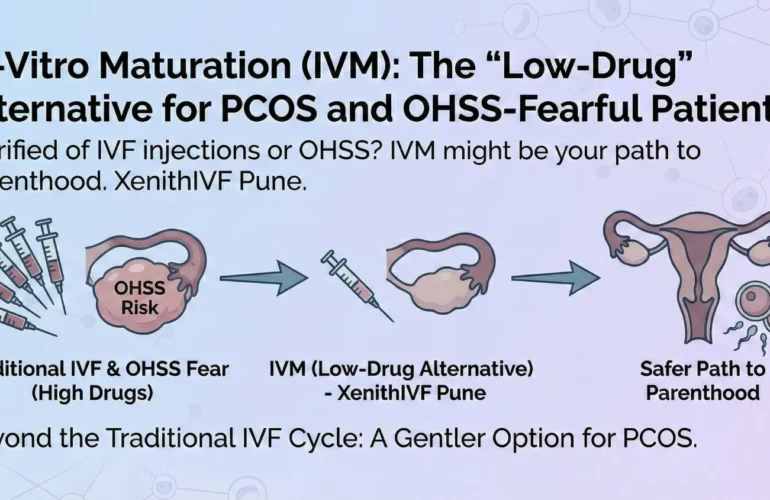
In-Vitro Maturation (IVM): The “Low-Drug” Alternative for PCOS and OHSS-Fearful Patients
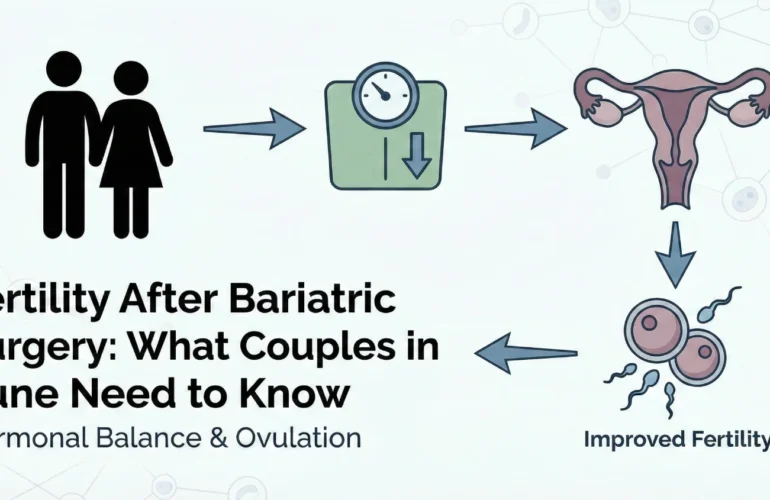
Fertility After Bariatric Surgery: What Couples in Pune Need to Know
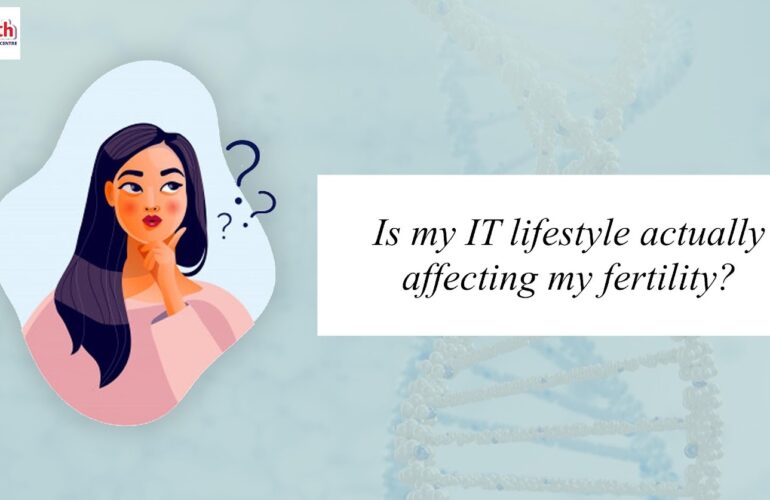
Sitting, Stress, and Screens: How Pune’s IT Lifestyle (Hinjewadi/Magarpatta) Impacts Your Fertility
